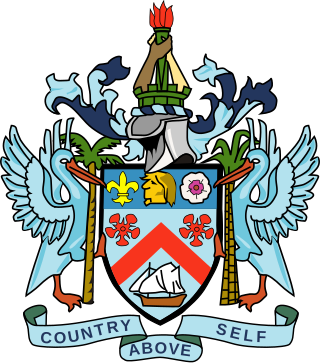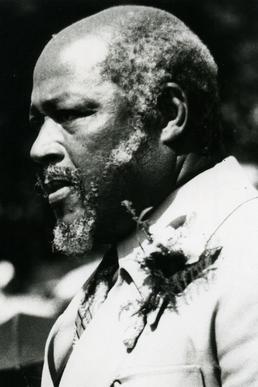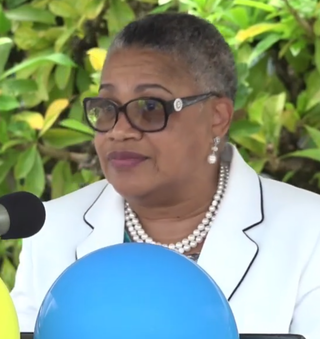This article needs additional citations for verification .(March 2019) |
His Lordship Justice Albert Redhead was a Grenadian lawyer and judge who worked in many of the Commonwealth countries of the Caribbean.
This article needs additional citations for verification .(March 2019) |
His Lordship Justice Albert Redhead was a Grenadian lawyer and judge who worked in many of the Commonwealth countries of the Caribbean.
Redhead received a Bachelor of Laws degree from the University of London in 1971 and in 1972 was called to the bar of England and Wales by the Middle Temple.
In 1974, Redhead moved to Saint Kitts and Nevis, where he began working as a Crown Counsel. In 1975, he became Registrar of the Saint Kitts and Nevis courts and also served as a magistrate of the courts. In 1980, he became the Director of Public Prosecutions for Saint Kitts and Nevis.
In 1985, the Judicial and Legal Services Commission of the Caribbean Community appointed Redhead to be a High Court Judge of the Eastern Caribbean Supreme Court. In 1997, he became an Appeals Court Judge of the same court. Since retiring from the Court in 2003, he was twice re-appointed as an Acting High Court Judge of the Court: from 2004 to 2006 and he was again appointed in 2007.
As a High Court Judge, Redhead was assigned to reside in and hear cases from a number of countries, including Saint Kitts and Nevis, Montserrat, Anguilla, and Saint Lucia. His most recent appointment was to reside in and hear cases from the British Virgin Islands.
He died March 4, 2019, at the age of 80 in Antigua and Barbuda. [1]

The politics of Saint Kitts and Nevis takes place in the framework of a federal parliamentary democracy. Saint Kitts and Nevis is an independent Commonwealth realm with Charles III as its head of state, viceregally represented by a Governor-General. He acts on the advice of the prime minister, who is the majority party leader in the National Assembly, and who, with a cabinet, conducts affairs of state.

The British West Indies (BWI) were colonised British territories in the West Indies: Anguilla, the Cayman Islands, Turks and Caicos Islands, Montserrat, the British Virgin Islands, Antigua and Barbuda, The Bahamas, Barbados, Dominica, Grenada, Jamaica, Saint Kitts and Nevis, Saint Lucia, Saint Vincent and the Grenadines, British Guiana and Trinidad and Tobago. Other territories include Bermuda, and the former British Honduras. The colonies were also at the centre of the transatlantic slave trade, around 2.3 million slaves were brought to the British Caribbean. Before the decolonisation period in the later 1950s and 1960s the term was used to include all British colonies in the region as part of the British Empire. Following the independence of most of the territories from the United Kingdom, the term Commonwealth Caribbean is now used.

Caleb Azariah Paul Southwell was the second Premier and first Chief Minister of Saint Kitts and Nevis in the Caribbean. He also worked as a teacher, police officer, and trade unionist.
Sir Vincent Frederick Floissac was a Saint Lucian jurist and politician. He was styled The Rt. Hon. Sir Vincent Floissac by virtue of his membership of the Privy Council of the United Kingdom.

The Eastern Caribbean Supreme Court (ECSC) is a superior court of record for the Organisation of Eastern Caribbean States (OECS), including six independent states: Antigua and Barbuda, the Commonwealth of Dominica, Grenada, Saint Kitts and Nevis, Saint Lucia, Saint Vincent and the Grenadines and three British Overseas Territories. It has unlimited jurisdiction in each member State.
Sir Charles Michael Dennis Byron is a former president of the Caribbean Court of Justice. He also serves as President of the Commonwealth Judicial Education Institute, and is former President of the International Criminal Tribunal for Rwanda (ICTR), and former Chief Justice of the Eastern Caribbean Supreme Court. He was born in Basseterre, Saint Kitts and Nevis.

Sir Clement Athelston Arrindell was the first governor-general of Saint Kitts and Nevis, serving from 1983 to 1995, and also served as the country's final colonial governor, from 1981 to 1983.

The monarchy of Saint Kitts and Nevis is a system of government in which a hereditary monarch is the sovereign and head of state of Saint Kitts and Nevis. The current monarch of Saint Kitts and Nevis, since 8 September 2022, is King Charles III. As sovereign, he is the personal embodiment of the Crown of Saint Kitts and Nevis. Although the person of the sovereign is equally shared with 14 other independent countries within the Commonwealth of Nations, each country's monarchy is separate and legally distinct. As a result, the current monarch is officially titled King of Saint Christopher and Nevis and, in this capacity, he and other members of the royal family undertake public and private functions domestically and abroad as representatives of Saint Kitts and Nevis. However, the King is the only member of the royal family with any constitutional role.
Sir Brian George Keith Alleyne, KC is a Dominican jurist, politician and judge.
Sir Hugh Anthony Rawlins is the former Chief Justice of the Eastern Caribbean Supreme Court; he succeeded Brian George Keith Alleyne in the position in 2008 and served until 2012. He had previously served as High Court Judge on the Court, residing in and hearing cases from Saint Kitts and Nevis in that capacity since 2005.

Adrian Dudley Saunders is a judge from Saint Vincent and the Grenadines. Since 2005, he has been a judge of the Caribbean Court of Justice.

Dame Janice Mesadis Pereira, is the Chief Justice of the Eastern Caribbean Supreme Court. She became the first female Chief Justice and the first person from the British Virgin Islands to become Chief Justice in 2012.
The Hon. Justice Ephraim Francis Georges is a judge from the Commonwealth of Dominica. He has been a judge in a number of Commonwealth countries and on the Eastern Caribbean Supreme Court.
Francis Belle is a Barbadian lawyer and judge who has worked as a lawyer and a judge in a number of Commonwealth countries in the Caribbean.
Vicki Ann Ellis is a Saint Lucian lawyer and judge. She has been a High Court Judge of the Eastern Caribbean Supreme Court since 2012.
M. E. Birnie Stephenson-Brooks is a Guyanese lawyer and judge who has worked in a number of Commonwealth countries in the Caribbean.
Brian Cottle is a lawyer and judge from Saint Vincent and the Grenadines who has worked in a number of Commonwealth countries in the Caribbean.
Sir Lascelles Lister Robotham was a Jamaican lawyer and judge who worked in a number of Commonwealth countries in the Caribbean. He was Chief Justice of the Eastern Caribbean Supreme Court from 1984 until his retirement in 1991.
Dr. Joseph Samuel Archibald, QC was a Saint Kittitian-born British Virgin Islander jurist, lawyer, registrar, magistrate, former Director of Public Prosecutions, and former Attorney General.
Dame Constance Viola Mitcham, is a politician in Saint Kitts and Nevis. She was the first woman elected to the National Assembly for that country. She was also the first woman to serve as acting prime minister for the country.